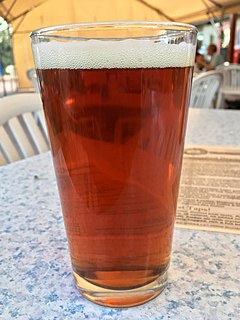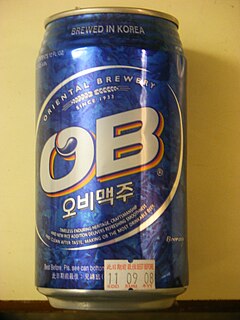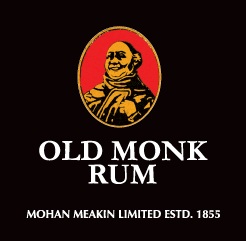
Pale ale is a typically golden to amber coloured style of ale which is brewed using an ale yeast and predominantly pale malt. The term first appeared around 1703 for beers made from malts dried with high-carbon coke, which resulted in a lighter colour than other beers popular at that time. Different brewing practices and hop quantities have resulted in a range of tastes and strengths within the pale ale family.

Solan is a city in the Indian state of Himachal Pradesh and the district headquarters of Solan district. The 3rd largest Municipal Corporation of Himachal Pradesh after Shimla and Dharamshala, it is located 45.5 kilometres (28 mi) south of the state capital, Shimla, and at an average elevation of 1,550 metres (5,090 ft). The hill-town is named after the Hindu goddess Shoolini Devi ~ who is a manifestation of Goddess Durga in Her warrior aspect. Shoolini literally means 'the goddess wielding the spear'. Every year in June, a fair venerating the Goddess is held, featuring a 3-day mela at the central Thodo ground. Solan was the capital of the erstwhile princely state, Baghat.

Mohan Meakin is a large group of companies which started with Asia's first brewery incorporated in 1855 by Edward Dyer at Kasauli in the Himalayan Mountains in India under the name Dyer Breweries.
In India, traditional beer has been prepared from rice or millet for thousands of years. In the 18th century, the British introduced European beer to India. Beer is not as popular as stronger alcoholic beverages like desi daru and Indian-made foreign liquor, such as Indian whiskey. The most popular beers in India are strong beers.
Murree Brewery ; PSX: MUREB) is a Pakistani multinational manufacturer of alcoholic and non-alcoholic beverages. It is Pakistan's largest and oldest producer of alcoholic products. In 2015, it produced 10 million litres of beer, along with hundreds of tons of single malt whisky, vodka and brandy. Founded by the British in 1860, it is a publicly traded company listed on the Pakistan Stock Exchange, its products are exported to India and Bangladesh. In 2014, the company established a flagship store on Park Avenue, in Manhattan, New York City. In 2013, it was named by Forbes as one of Asia's 200 best companies.
Beer in Africa, especially lager, is produced commercially in most African countries, and varieties of beer are also made by indigenous people. Beer is served in a range of locales, from neighbourhood shebeens to upscale bars. Many countries have standardized beer bottle sizes, which are cleaned and re-used, and so when buying beer at a store often people must pay a deposit on the bottle as well as the price of the beer. An alternative to glass-bottle beers is local beer sold in tetra-pak style paper cartons.

Oriental Brewery or OB is a South Korean brewery currently owned by AB InBev, and initially founded by Doosan Group.

Old Monk Rum is an iconic vatted Indian dark rum, launched in 1954. It is a dark rum with a distinct vanilla flavour, with an alcohol content of 42.8%. It is produced in Ghaziabad, Uttar Pradesh.

Beer in Asia began when beer was produced in Sumer, Mesopotamia circa 6000 years ago. It was introduced by Europeans in the 19th century, with modern breweries established in British India, the Dutch East Indies, China, and Japan. Asia's first modern brewery was established in 1830 in India entirely using European brewing technology.

Most distilled spirits that are labelled as "whisky" in India are a form of Indian-made foreign liquor, commonly blends based on neutral spirits that are distilled from fermented molasses with only a small portion consisting of traditional malt whisky, usually about 10 to 12 percent. Outside India, such a drink would more likely be labelled a rum. According to the Scotch Whisky Association's 2013 annual report, unlike the European Union (EU), "there is no compulsory definition of whisky in India, and the Indian voluntary standard does not require whisky to be distilled from cereals or to be matured. Very little Indian 'whisky' qualifies as whisky in the EU owing to the use of molasses or neutral alcohol, limited maturation and the use of flavourings. Such spirits are, of course, considerably cheaper to produce than genuine whisky." Such molasses-based blends make up 90 percent of the spirits consumed as "whisky" in India, although whisky wholly distilled from malt and other grains, is also manufactured and sold.
Indian-made foreign liquor (IMFL) is the official term used by governments, businesses and media in India to refer to all types of hard liquor manufactured in the country other than indigenous alcoholic beverages such as feni, toddy, arrack and others.
Sooraa is a strong distilled alcoholic drink originating from the Indian subcontinent. It is referred to as an anaesthetic by Suśruta. Other ancient medical authorities also mention it; Charaka referred to making a woman with a miscarriage senseless to pain by administering alcoholic drinks like sooraa, sīdhu, ariṣṭa, madhu, madirā or āsava.

The beers of the Caribbean are unique to each island in the region, although many are variants of the same style. Each island generally brews its own unique pale lager, the occasional stout, and often a non-alcoholic malta beverage. Contract-brewing of international beers is also common, with Heineken Pilsener and Guinness Foreign Extra Stout being the most popular. The beers vary between the islands to suit the taste and the brewing method used.
Eden Mill St Andrews is a specialist independent microbrewery and distillery based in Guardbridge, Scotland, about 3 miles (5 km) north-west of St Andrews. It is located on a 38-acre (15 ha) site owned by the University of St Andrews. Brewing began in July 2012 and the brewery was "on track to lift turnover from £500,000 in its first full year to around £2 million in 2014".
Lion Brewery or Lion Brewery (Ceylon) PLC is a predominantly Sri Lankan owned and operated brewery. The company is listed on the Colombo Stock Exchange and its stock is part of the S&P Sri Lanka 20 Index. Lion Brewery produces the highest selling beer, Lion Lager, in both Sri Lanka and the Maldives.
Commercial brewing of beer in Myanmar commenced in 1886 and until 2015 was dominated by a single producer, Myanmar Brewery Ltd.
Ved Rattan Mohan was an Indian entrepreneur and the creator of Old Monk, an iconic vatted Indian dark rum. Born to Narendra Nath Mohan, the founder of Mohan Meakin, he took over the company in 1969 after the death of his father. During his tenure as the managing director, the company expanded to add three distilleries and two breweries and added new lines of business such as breakfast food and juices, glass manufacturing, vinegars, and cold storage. He also introduced, Solan No. 1 and Golden Eagle, two popular liquor brands, besides Old Monk. He was the mayor of Lucknow for two terms and served as a member of Rajya Sabha. The Government of India awarded him the Padma Shri, the fourth highest civilian award, in 1967. He received the Padma Bhushan, the third highest civilian award, in 1971.

Mohan Shakti National Heritage Park, also referred to as the Solan Heritage Park, is a modern-era Indian heritage complex in Harat, near Solan, Himachal Pradesh, India. It is about 40 kilometers south of Shimla, about 15 kilometers north of Solan, and 85 kilometers northeast of Chandigarh. Spread over 40 acres of land, it was founded by Kapil Mohan – a retired Brigadier General of the Indian Army, a Padma Shree awardee of India and an heir to the liquor-manufacturing family business Mohan Meakin Limited of Solan and Ghaziabad. The site is about 10 kilometers from the Solan "Old Monk" brewery operations of Mohan Meakin. The heritage complex costs around Rs 100 crore to build.














